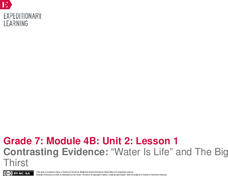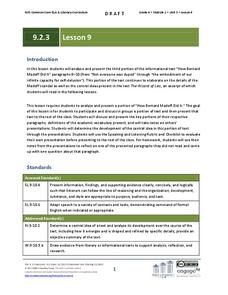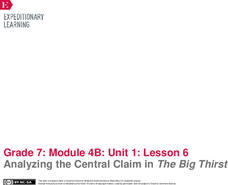C3 Teachers
Black Genius: How Did Black Genius Help Build American Democracy?
"How did the slavery system undermine the United States' democratic principles?" This question launches a study of how the Preamble to the Declaration of Independence, Article I, Section 2 of the U.S. Constitution, and Article IV,...
EngageNY
Contrasting Evidence: “Water Is Life” and The Big Thirst
Sometimes differing arguments support the same claim. Scholars complete a graphic organizer comparing how two authors support the claim that people need to better manage the world's water supply. Pupils also complete a graphic organizer...
Curated OER
Nonfiction Genre Mini-Unit: Persuasive Writing
Should primary graders have their own computers? Should animals be kept in captivity? Young writers learn how to develop and support a claim in this short unit on persuasive writing.
EngageNY
Grade 9 ELA Module 2, Unit 3, Lesson 11
Who is to blame for Bernie Madoff's crime? Class members look for evidence Diana B. Henriques uses in The Wizard of Lies: Bernie Madoff and the Death of Trust to support her claims that we share the responsibility with Madoff.
EngageNY
Grade 9 ELA Module 4, Unit 1, Lesson 22
Class members read "Satyagraha," the concluding section of Marc Aronson and Marina Budhos' Sugar Changed the World: A Story of Magic, Spice, Slavery, Freedom, and Science, and analyze how the authors support their claim that terrible...
EngageNY
Analyzing Text Structure: “Teen Slang: What’s, Like, So Wrong with Like?”
What did you say? Class members read Teen Slang: What’s, Like, So Wrong with Like and make notes in the margin to determine the gist. They then analyze the text to identify claims made and the evidence to support the claims. After ...
Clever Student Training Company
Analyzing the Essay
The skill set required of readers of informational text includes the ability to identify an article’s thesis or main idea, as well as the supporting points. Learners can practice these skills by analyzing an essay about the treatment of...
EngageNY
Evaluating an Argument: The Polyface Local Sustainable
Who has the better argument? Class members work in small groups to compare the arguments on the Example of Strong and Flawed Arguments sheet. They then analyze Michael Pollan’s argument on pages 161–166 of The Omnivore’s Dilemma and...
Curated OER
Claims in "The Crisis, No. 1"
"The Crisis, No. 1" is the focus of a series of exercises that ask learners to read closely and annotate Thomas Paine's text. Groups identify claims and evidence in the essay and present their arguments to the class. Teacher background...
EngageNY
Presenting a Research-Based Claim: Visual Aid and Peer Critique
Back to the drawing board. Scholars work on the visual to complement their claim presentations using the Criteria for the Cascading Consequences Chart Visual as a guide. They then practice their presentations with partners.
Curated OER
Don't Believe the Hype
Are hand sanitizers good for you? What about the environment? Research the science behind commonly used cold medicines. The class reads an article, creates a product poster, and conducts independent research on product claims made by...
EngageNY
Grade 9 ELA Module 2, Unit 3, Lesson 9
Are we interested in crime stories because we either identify with the victims or enjoy watching the rich suffer? Do we feel guilty and want someone to take our blame and let us feel innocent? Groups investigate how the author of "How...
EngageNY
Mid-Unit Assessment: On-Demand Writing – Conflicting Interpretations of the 13th and 14th Amendments
The authors of the court's decision and the dissenting opinion on Plessy v. Ferguson disagreed on their interpretations of the Thirteenth and Fourteenth Amendments. Scholars set out to show how with an on-demand writing prompt. They...
K20 LEARN
The Sirens: Is It a Bird or Is It a Fish?
Fish, fowl, foul fish, or foul fowl? Just what is a siren? Young scholars listen to a video clip and draw what they imagine when they hear the word "siren." After watching several videos depicting sirens, class members read "The Sirens'...
Howard Hughes Medical Institute
Developing an Explanation for Mouse Fur Color
Whether or not you think mice are nice, you'll love the colorful activity! Scholars examine evidence for evolution in the rock pocket mouse through video, discussion, and collaborative work. Learners watch a video regarding variation in...
University of North Carolina
Argument
What elements make up a successful argument? A helpful resource describes aspects of an argument such as the claim, evidence, counterargument, and audience. Perfect as an individual assignment for a flipped lesson or collaborative work,...
Education Bureau of Hong Kong
Fundamentals of Critical Thinking
Analyzing arguments is key to critical thinking. Colorful slides teach viewers how to recognize the structure of an argument, the claims, and the validity of the evidence used to support an argument. Then, provided scenarios permit...
EngageNY
Forming Evidence-Based Claims: Should Lyddie Sign the Petition?
Pupils reread selected passages from Katherine Paterson's novel Lyddie. After they finish, individuals gather textual evidence supporting whether Lyddie should sign a controversial petition and record their findings on graphic organizers.
Curated OER
States and Mates
Discuss and reflect on the concept of allies and alliances. The class examines the competition between the United States and Venezuela. Using the New York Times, they search for examples of geopolitical alliances. In addition, they write...
EngageNY
Grade 9 ELA Module 2, Unit 3, Lesson 5
After rereading the full text of Walter Mosley's essay "True Crime," groups complete an evidence collection tool worksheet, and then class members independently draft a multi-paragraph, evidence-based response that identifies how Mosley...
EngageNY
Analyzing the Central Claim in The Big Thirst
Quench the class's thirst for knowledge while building analytical skills. Scholars listen as the teacher reads excerpt from the book The Big Thirst. They then complete a close read and answer text-dependent questions from pages one...
University of North Carolina
Evidence
You can claim that soda rots people's teeth or that dinosaurs were actually birds, but your claim will not stand up if it is not backed by evidence. A handout from UNC Writing Center, the seventh in the Writing the Paper series of 24,...
Curated OER
Defining Love
After reading and discussing Love Medicine by Louise Erdrich, pupils compare/contrast the concept/theme of love within several multiple pieces of literature. They must support their claims with textual evidence. In addition, they analyze...
Bonneville
Titanium Dioxide Raspberry Solar Cell Data Sharing
Concerned about how well others did on the experiment? Scholars share results from the titanium dioxide raspberry solar cell test they performed in the previous lesson. After analyzing the data, they come up with a claim about the...

























